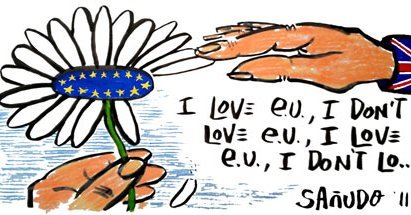Joining or not: 1950s to 1969
After the Second World War, nationalist feelings were reinforced in the UK because the nation was the European power, which withstood Nazism alone for a whole year. The British saw the integration ideas as an alliance of the defeated. In addition, the Labour party, who won the election in 1945, was suspicious about dominant Christian-Democrat government of The Six. The government feared that UK participation in the Coal and Steel Community would undermine social protection of British workers. When The Six invited the United Kingdom to join in 1950, the Labour government of the time refused, arguing that British coal and steel industries had been nationalised and it was thus impossible to put it under international management. The Conservative government that followed in 1951 did not change the government’s position that was consensual in the UK.
During the 1950s, the economic situation was less favourable to the UK, especially compared to the booming continental economies. In addition, political relations with the Commonwealth came loose. In 1957, when The Six were firming the Treaty of Rome, the UK was in favour of free-trade area without custom union and refused to join the European Economic Community (EEC). The idea of a free-trade area was to maintain Britain relationship with the Commonwealth and to exclude agricultural products (already against the CAP!). Indeed, with the CAP, a common external tariff was set on imported products while the Commonwealth was providing a lot of agricultural products to the UK. In 1959, the UK signed the treaty of Stockholm with Sweden, Norway, Denmark, Switzerland, Austria and undemocratic Portugal to establish the European Free-Trade Area (EFTA). EFTA was not such a success for the UK. Even the United States encourages them to join the EEC.
In 1961, the Conservative Prime minister Macmillan launched the idea of opening negotiation for adhesion to the EU (as did Ireland and Denmark). The De Gaulle’s 1963 veto can be explained by two factors. First of all, the United States were strongly supporting the idea of the UK in the EEC and De Gaulle perceived it as a threatening “foreign federator”. Secondly, Britain was invited to the negotiations on agricultural products in 1962 and tried to question the fundamental rules of the Common Agricultural Policy (CAP) and this was not acceptable for De Gaulle.
In a time of European economic stagnation and after the crisis of the empty chair (De Gaulle’s refusal to sit in meetings), while the UK was facing difficult monetary and economic situation, the Labour Prime Minister Wilson announced a new adhesion demand in May 1967 at the House of Commons. De Gaulle was straightaway against enlargement to the UK, while Georges Brown, Foreign Office secretary, had changed negotiation strategy pledging for a strong Community not only economically but also in the political and military fields; this was supposed to reassure De Gaulle in case of German rearmament. The Commission statement was in favour of an enlargement once economic difficulties would be overcome, but France stuck to its position. It is only after De Gaulle resigned in 1969, that it became possible for the UK to have proper negotiation with the European Economic Community.
The UK being part of the Common Market: 1970 - 1979
In 1970, conservative won the election and Edward Heath became Prime Minister. Anthony Barber and Sir Alec Douglas-Home were in charge of carrying negotiations for the UK’s adhesion. Three principles lead this negotiation: the Acquis Communautaire (all that had been achieved by the EEC) had to be maintained, the Hague agreement that open the door for Economic and Monetary Union could not be put into question, transitory measures could not modify existing treaties. Negotiations were hard. They first focused on details to delay the moment of discussing the major point of disagreement – transitory measures for the Common Agricultural Policy, British contribution to the community budget, and sugar exportation to the Commonwealth.
Finally, an agreement was reached in June of 1971. There was a strong division between the Tories and the Labour Party. According to Stephen Tindale, associate fellow at the Centre for European Reform, “in the 1960s and 70s it was the Labour Party that was opposed to ‘Europe’. In 1960 the then Labour leader Hugh Gaitskell argued that Britain joining the EEC would mean the end of a thousand years of history. The Labour party was attracted at that time to nationalisation and ‘socialism in one country’.” Harold Wilson, head of the Labour party pledged with the motto “no entry on Tory terms”, but Heath’s proposal to the Parliament reached an overwhelming majority of 356 votes in favour of joining the EU (244 against). “Heath did indeed say that the EEC was about economics – hence the name European Economic Community. There was no enormous public debate at the time, and no referendum. It was the elite that took Britain in” specifies Tindale. Enlargement to the UK, Ireland, Denmark and Norway was put into referendum in France, Pompidou, the French President, wanting to legitimise his policy. Held in 1972, the Yes vote won by 68% but with a low turnout (40%). On January 22nd 1972 the adhesion treaty was signed – it is in September that Norway voted against the ratification.
The UK joined the European Economic Community in 1973. But it was not the end of an uneven relationship across the Channel.
Labour was still opposing membership to the EEC. The issue was hotly debated during the general election campaign. When Harold Wilson became Prime Minister in 1974, he announced that he would try to renegotiate a more satisfying agreement which would be submitted to referendum. Two main concerns were raised, the change of the CAP and the reduction of the British contribution to the community budget. The Dublin agreement (March 1975) provided a correcting mechanism on budgetary matters and few changes on imports from New-Zealand, but the main theme of the Labour campaign – abandoning the economic and monetary union and the European Union objective – were not even on the agenda of discussion.
Wilson put the renegotiated terms of membership into referendum. He himself campaigned in favour of a continued membership and gave a long speech in the House of Commons to support it in March 1975. He “allowed members of his government to campaign either for or against depending on their individual views”. During the campaign the left part of Labour was against the continued membership and the right wing was in favour of it. In June 1975, 67% of voters agreed on being part of the Community. The referendum had the positive effect of confirming public support for UK membership in the EEC, but the renegotiation did not solve the problem of the British contribution to the budget.
Margaret Thatcher and the EEC: 1979 - 1990
In 1979, Margaret Thatcher was appointed Prime Minister. She was strongly in favour of free-market economy and of reducing state intervention in the economy. She also had a nationalist discourse on the UK. The Iron Lady is often referred to as being a Eurosceptic. It is partly true. She was in favour of a certain kind of European integration, one that will enhance an open market for Europe. Afterall, she is the one responsible for the European Union’s Single Market.
She is well known for her phrase “I want my money back” (September 1979). Indeed, the corrective mechanism did not solve the British contribution. As Tindale ironically puts it, the phrase “was loved – keeping money from French farmers goes down particularly well in the UK!” Then, tuff negotiations started and led to the agreement on the British rebate (1984). It is a mechanism to balance the costs and benefits from the EEC, since the main part of the Community budget was spent on the CAP at that time and that the UK, a rich country, was contributing a lot but not benefiting much from the CAP. The conception of “we pay for what we gain” has since been a constant feature of European negotiations.
Margaret Thatcher also firmed the Single European Act, which created the Single Market and extended qualified majority voting (QMV) in the Council (thus reducing possibility of veto by one country). Margaret Thatcher wanted European integration to create a large market without borders, and the British Commissioner Lord Cockfield, who was very close to Thatcher, was in charge of preparing the Single Market. But, to the President of the Commission, Jacques Delors, in order to achieve a Single Market, institutional reforms were needed to avoid the inefficiency of consensus. He managed to convince Thatcher to accept the extension of the QMV and to recognise the need for the 300 harmonisation directives in order to remove technical barriers to trade. She is the British Prime Minister who allowed Europe to move forward to more political integration and toward the Maastricht Treaty.
Eurosceptic Tories and pro-European Labour? 1990s
As for the economic and monetary union, Thatcher and her successor John Major were isolated in their refusal for more economic and political integration, not managing to build alliance and compromise among the Council. John Major agreed for an opt-out option for the single currency and social matters, but it epitomised the British isolation. The ratification of the Maastricht Treaty was not an easy piece to go for Major, who had to have two different discourses in Brussels and in Westminster.
The Tories, in Margaret Thatcher’s legacy, were increasingly against European integration. To them, the EU was becoming more and more federal taking sovereignty and national identity away from British. Some Eurosceptic Tories were against the ratification of the Maastricht Treaty. They voted with the Labour against Major, who had to ask for a second vote the day after; a vote of confidence. Major manage to win the majority on the European matters, but it exposed the beginning of divisive lines within the Tories. However, the Prime Minister hosted the European council in Birmingham and in Edinburg in 1992. Several difficulties were overcome there and the UK managed to build up alliances with its European partner. It announced the shift in Britain’s position in EU negotiation that was to occur with Blair.
To sum up this long article, we observe constant theme and antagonism along history. Common Agricultural Policy, British contribution to the budget and political integration has been frequent conflicting topics in the relations between the UK and the EU. However, actors position has changed. Labour were rather anti-European at the beginning and Tories in favour; it is now the contrary that is true. This historical overview allows understanding the context in which the debate is occurring currently.


Follow the comments: |
|
